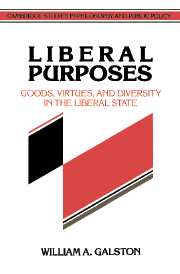Book contents
- Frontmatter
- Contents
- Acknowledgments
- PART I LIBERALISM AND POLITICAL PHILOSOPHY
- PART II LIBERALISM AND NEUTRALITY
- 4 Liberalism and the neutral state
- 5 Liberalism and neutral public discourse
- 6 Moral personality and liberal theory
- 7 Pluralism and social unity
- PART III LIBERALISM WITHOUT NEUTRALITY
- PART IV FROM THEORY TO PRACTICE IN THE LIBERAL STATE
- Notes
- Index
4 - Liberalism and the neutral state
Published online by Cambridge University Press: 05 June 2012
- Frontmatter
- Contents
- Acknowledgments
- PART I LIBERALISM AND POLITICAL PHILOSOPHY
- PART II LIBERALISM AND NEUTRALITY
- 4 Liberalism and the neutral state
- 5 Liberalism and neutral public discourse
- 6 Moral personality and liberal theory
- 7 Pluralism and social unity
- PART III LIBERALISM WITHOUT NEUTRALITY
- PART IV FROM THEORY TO PRACTICE IN THE LIBERAL STATE
- Notes
- Index
Summary
The contemporary revival of political theory in the Anglo-American intellectual community has for the most part been a revival of liberal theory. This should not have come as a great surprise. Most Anglo-Americans are, in one way or another, liberals; all are deeply influenced by the experience of life in liberal societies.
Although this revival of liberal theory has been much discussed, it is less often noted that in one decisive respect it remains rooted in the climate of moral skepticism that it has supplanted. Most contemporary liberal theorists are deeply mistrustful of what John Rawls has called “perfectionism” – the philosophic attempt to identify superior aspects of human existence or traits of character and, once having identified them, to use them as goals of political life. Contemporary liberal theory consists of the attempt to combine this skepticism about theories of the good life with the belief in philosophically defensible principles that regulate relations among individuals.
It is my thesis that this defense of liberalism is fundamentally misguided. No form of political life can be justified without some view of what is good for individuals. In practice, liberal theorists covertly employ theories of the good. But their insistence that they do not reduces the rigor of their theories and leaves the liberal polity unnecessarily vulnerable to criticism.
There are, broadly speaking, two strategies for justifying the liberal state. The first begins by arguing for the worth of the way of life characterized by distinctively liberal or (as some say) bourgeois virtues and goals.
- Type
- Chapter
- Information
- Liberal PurposesGoods, Virtues, and Diversity in the Liberal State, pp. 79 - 97Publisher: Cambridge University PressPrint publication year: 1991
- 3
- Cited by

